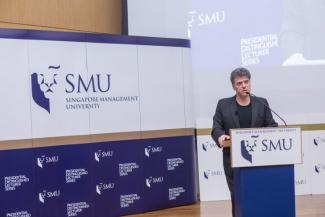
“I have spent the last 10 years since 2007 arguing that the future, i.e. the thing we look forward to, is extremely problematic, it’s flawed. It offers a lot of promise, but in actuality, it is failing in many aspects. The future is broken.”
So declared entrepreneur, author and broadcaster Andrew Keen, who is among the world’s best-known analysts of digital business and culture, and commentators on the digital revolution.
He is the author of four books: Cult of the Amateur, Digital Vertigo, The Internet Is Not the Answer and his latest international hit, How to Fix the Future.
Speaking to about 150 students, business leaders and the SMU Community at SMU’s Presidential Distinguished Lecture Series on 20 March 2018, Mr Keen said in the mid-1990s during the dawn of the internet age, the first generation of web entrepreneurs like himself were very excited when they imagined the future then because they thought that the beginning of the internet would be a revolution that would empower everyone and engender a new level playing field in economics and create a remarkable amount of jobs, that it would be liberating for culture, and reinvent business.
Problems of the digital age
However, as a consequence of the structural nature of the digital economy, Keen contended that we have increasingly a winner-takes-all economy. “The tiny group of dominant, successful, highly capitalised companies are all West Coast tech companies: Facebook, Google, Apple, Amazon and Microsoft. It’s becoming harder and harder to compete against these dominant players. This results in increasing inequality and carving out/hollowing out of the middle class,” he said. Keen admitted that it would not be fair to blame all the inequality in the West on the digital revolution, but it is certainly playing a role. Therefore, the future is broken because it was thought that the digital revolution would bring about more equality, but what resulted was more inequality.
Secondly, it was also thought that the digital age would bring about more jobs and creativity. However, jobs are being destroyed in the latest round of the digital revolution. In the medium term, we are faced with a massive job crisis through automation and smart technology. For example, self-driving cars are replacing drivers, algorithms are replacing surgeons and engineers, robots are replacing fast food restaurant workers.


Thirdly, Keen argued that the digital age have created a cultural crisis. “We were promised the new technology would enrich our culture, enable people to speak with one another in a more civil and constructive way. Much of this tech is used responsibly, but what seems to have transpired out of this user generated social media revolution where the gatekeeper/curator is removed is increasing incivility and hatred.” He felt that the narcissistic self-obsessed nature of this culture is generating a cultural crisis and creating more technological addiction. Above all else, Keen suggested that the digital age has created a crisis of democracy and a crisis of truth because of the untruths being put out as a consequence of the removal of the gatekeeper, resulting in people losing faith in truth and in knowing what to trust.
Finally, Keen said the future is broken because the dominant business model of Silicon Valley does not work. It was based on businesses giving out products for free and sell advertising on the backend. The nature of this business model is that every time one uses the services, he is being watched – what Keen calls Surveillance Capitalism. In short, consumers pay for free products by trading away their personal data.
So what can we do about it?
To reshape the future and to clean up the digital revolution, Keen has identified five key tools: regulation, innovation, consumer power, citizen engagement and education.
Of the five, he felt that regulation is the key. “Regulation matters, because it is the only way that we can fight back against these new dominant powers,” he said. He also put forward the idea that new kinds of innovation that respect the users and their privacy are needed. He contended that the super-rich need to be held accountable, and take the lead in confronting the great challenges of our new age with their resources and intelligence. As for education, Keen said that throughout history, humans have responded to great disruptions by acting and shaping the future in a way that reflects a better world. To do that, Keen felt that training children with agency - one's independent capability or ability to act on one's will – will be important.
To discover how these tools are being put into practice around the globe, Keen had travelled to digital-oriented Estonia, where Skype was founded and the first country in the world to offer “e-residency,” an electronic passport that allows any small-business owner to use a variety of Estonian services and technologies. In Singapore, Keen explored the Smart Nation initiative which seeks to harness the power of networks, data and info-comm technologies to improve living, create economic opportunity and build a closer community.


In a lively Question and Answer session moderated by SMU President Professor Arnoud De Meyer, Keen fielded numerous questions from an enthusiastic audience, including mitigating the impact of cyber-attacks, how Facebook has been able to get people to reveal so much about themselves online, and whether he is optimistic about the future.
You can watch the video of the lecture here: